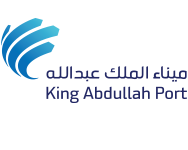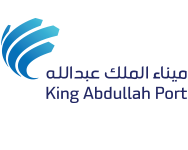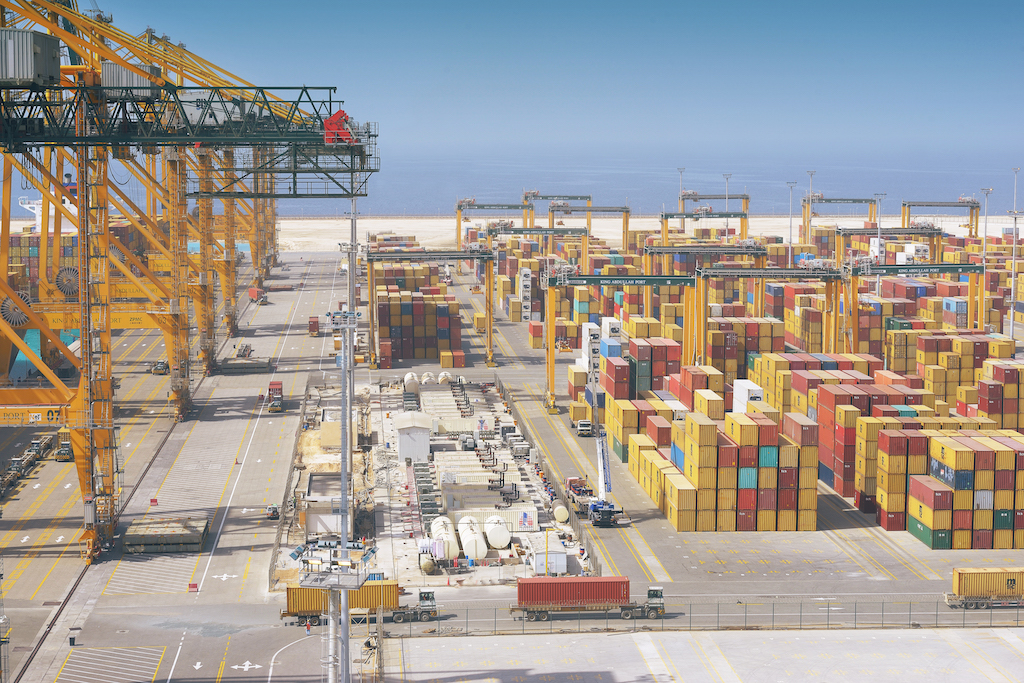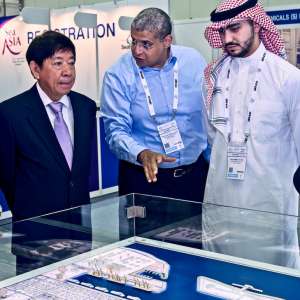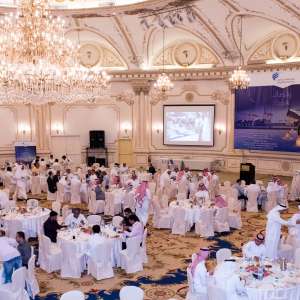King Abdullah Economic City, May 2017
Today, the Kingdom is moving with confidence and clarity towards promising new horizons with the implementation of Vision 2030 and the National Transformation Program 2020. Both the government and the private sector are working to implement initiatives in various economic fields. Now, the country is preparing to initiate a new phase of development and growth that will thrust it into a leading regional role, especially in the maritime and shipping sectors and their respective logistical services.
King Abdullah Port and Vision 2030
One of the most important roles that King Abdullah Port plays in Vision 2030 is its contribution to the Kingdom’s regional and international profile as a strategic trade corridor, directly supporting national efforts to diversify the economy and harness the Kingdom’s economic and trade potential as part of the overall development process. This includes the activation of the transportation sector, which will contribute to the Kingdom’s upcoming renaissance and further energize the proliferation of public partnerships with the private sector, thus reinforcing the latter’s contribution to the gross national product.
King Abdullah Port is characterized by its strategic geographic location and integrated services. It is well-known in the shipping industry that King Abdullah Port offers the latest in technology and is under the management of a notable selection of Saudi and international experts who are working together to launch a new era of maritime transport services regionally and globally.
In terms of geographical location, King Abdullah Port is unique in many ways, the first of which being its location on the Red Sea coast, the maritime corridor for 25% of the world’s non-oil trade. In addition, King Abdullah Port is located in King Abdullah Economic City and is in close proximity to the city’s Industrial Valley, as well as to Holy Makkah, Al Madinah and Jeddah, all of which generate massive trade movement.
King Abdullah Port plays an important role in the Kingdom’s realization of the goals of put forth in Vision 2030. It has already become a role model for the future because of its contribution to the activation of the private sector in such megaprojects. In addition to being the first privately owned, operated and developed port in the region, King Abdullah Port cooperates with all government entities related to maritime transport, including Saudi Customs, the Border Guards, the Saudi Food & Drug Authority and more, all through the Economic Cities Authority which is the port’s direct governmental partner.
King Abdullah Port has been participating in regional and international logistical forums and exhibitions since 2015 as part of its role of contributing to the Kingdom’s logistical role and promoting the content and goals of Vision 2030.
King Abdullah Port has effectively contributed to the Kingdom’s growth and was classified in the last quarter of 2016 as the ‘World’s Fastest Growing Port’ by Container Management Magazine, a British magazine specializing in ports, maritime transport and the shipping and handling of containers. Moreover, Alphaliner, the global leader in analyzing maritime transport data, port capabilities and the future of vessels and shipping route development, revealed that King Abdullah Port joined its 2016 list of the world’s top 100 container ports as number 98. These impressive achievements come after only three years of operation, as King Abdullah Port opened its doors to the world in early 2014.
Currently, King Abdullah Port is finalizing contracts with major companies seeking to invest in logistical services, with the announcement of new signings to take place soon.
With Saudi Hands…
King Abdullah Port team strives to empower Saudi youth as a key component of its developmental role. The team has worked with Saudi women especially, as a major goal of Vision 2030 is to increase the number of Saudi women in the labor market from 20% to 30%.
King Abdullah Port effectively contributes to meetinging this goal by directly or indirectly facilitating integrated logistical solutions for business owners, by providing expansion opportunities, thereby increasing the employment rate for Saudi men and women. Furthermore, King Abdullah Port has succeeded in attracting highly skilled and qualified national cadres, and has been successful in the recruitment of women. Today, more than 80 Saudi women are working in control rooms, management, information technology and engineering.
King Abdullah Port Numbers and Achievements in 2016
King Abdullah Port can point to many achievements in 2016, most notably:
- Raising annual throughput to 1.4 million TEU by the end of 2016, an increase of about 8% compared to 2015.
- Raising annual capacity to more than 4 million TEU, with the completion of the infrastructure of the fifth and sixth berths. This will follow the installation and operation of the two new berths this year, providing greater competitiveness and access to the most important trade capitals in the region and the world.
- Receiving 729 vessels in 2016, compared to 637 in 2015.
- Signing a funding agreement for expansion worth SR2.7 billion with SABB and ANB, reflecting the confidence of the banking sector in King Abdullah Port.
- Volume of investments exceeded SR10 billion by the end of 2016.
- Port management announced that the first phase of bulk cargo terminals is near completion and will be finalized by the end of this year, with a capacity of 3 million tons. Additionally, RORO terminals with a capacity of up to 300,000 vehicles will open by the end of 2017. The RORO terminals were made possible after the signing of an agreement with NYK Group, one of the largest automotive logistics companies in the world. The NYK Group will oversee RORO operations.
Towards the Future…With Confidence and Power
King Abdullah Port serves one of the largest maritime transport routes in the world, and is moving steadily toward becoming one of the leading ports worldwide. King Abdullah Port also strives to become a primary contributor in the realization of Vision 2030. Vision 2030 is based on three elements: first, the Kingdom being the land of the Haramayn, which is the destination of over a billion Muslims; second, the Kingdom’s massive investment potential; and third, the Kingdom’s strategic geographic location as a gateway to the world and a link between the three continents, overlooking the most important marine crossings in the world: the Arabian Gulf and the Red Sea.
###
About King Abdullah Port
Strategically located on the Red Sea coast on one of the world’s busiest maritime shipping lanes and with direct access to extensive transportation networks and urban centers, King Abdullah Port is the first fully privately owned, developed and operated commercial port in the Middle East.
King Abdullah Port occupies a total area of 15 square kilometers and enjoys close proximity to King Abdullah Economic City’s Industrial Valley and the bonded zone. The port makes an increasingly important contribution to the Kingdom’s regional and global role in trade, logistics and shipping. Once fully built, King Abdullah Port will be able to handle 20 million containers (TEU), 1.5 million vehicles (CEU) and 15 million tons of clean bulk cargo every year.
With state-of-the-art processing facilities, the world’s deepest 18-meter water berths, expanding roll-on/roll-off operations, and a fully-integrated Port Community System, King Abdullah Port is capable of receiving today’s diverse mega cargo ships, fulfilling the growing needs of the young and fast-growing population of the Kingdom and the region.
King Abdullah Port is testament to the important role of the private sector in realizing Saudi Vision 2030 and is well on its way to meeting its goal of becoming one of the top ports worldwide.
